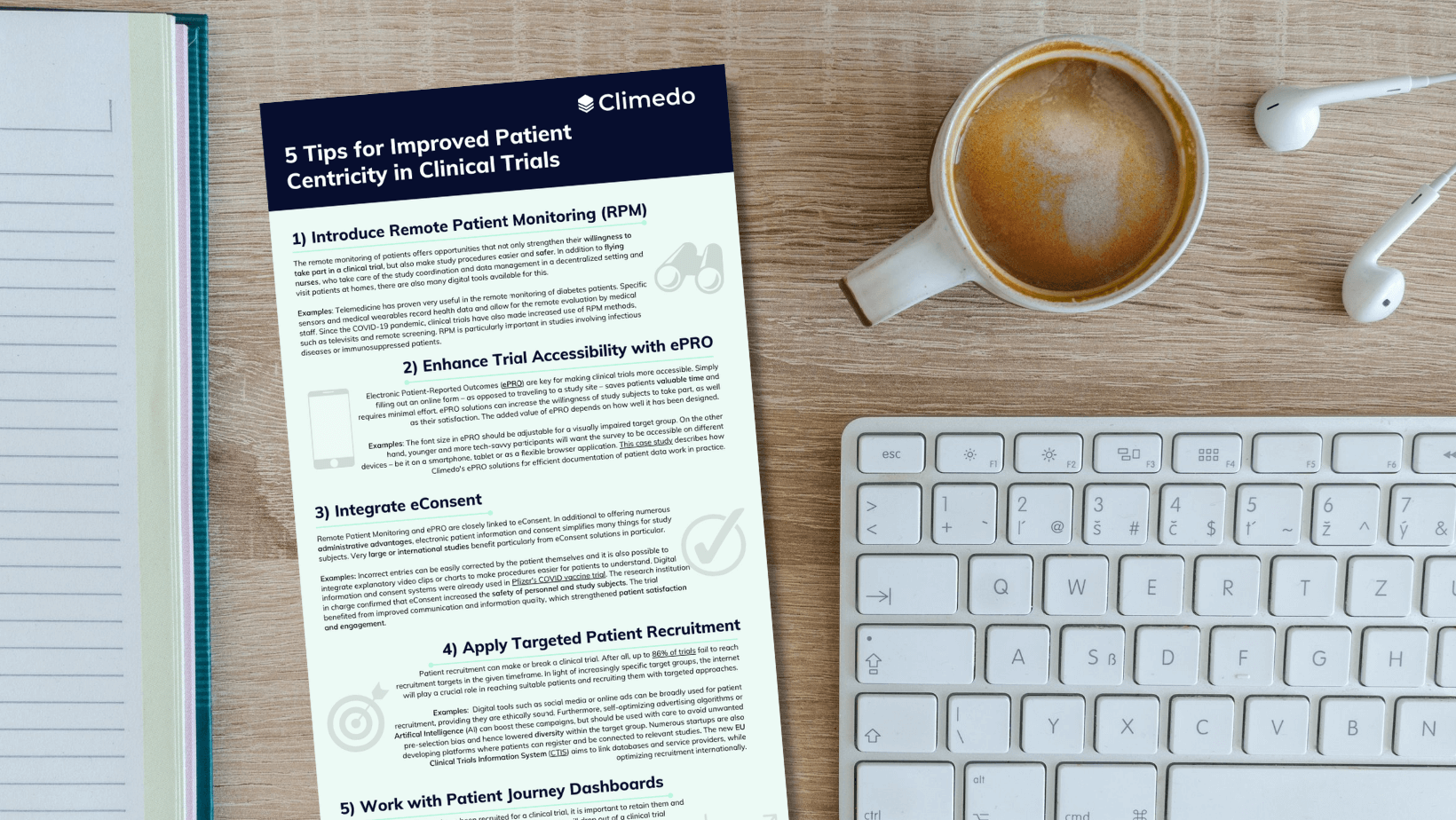Why Patients Drop Out of Studies Early – and What You Can Do About It

DATE
January 28, 2022
AUTHOR
Veronika | Co-Founder & COO
For clinical trials to be successful, it’s essential to recruit a sufficient number of patients within a given timeframe. At the same time, people often overlook how important it is to retain these patients and to maintain their commitment throughout the entire research phase. In fact, an average of 30 percent of subjects drop out of studies prematurely, which drives up costs and deteriorates data quality.
These drop-outs often complain about not being able to identify with the trial, as well as the amount of time and long-distance travel they require. They lose sight of the added value for themselves, which lowers their long-term motivation. But many of these factors can be avoided with an improved digital patient journey and active involvement of participants. Here are three ways to get your patients to stay engaged in the long-term.
What’s it about?
1. Incorporate patient feedback and encourage engagement
2. Reduce face-to-face appointments with telemedicine
3. Integrate studies in patients’ everyday life using ePRO
1) Incorporate patient feedback and encourage engagement
While a great deal of educational work happens during patient recruitment with regard to study objectives and procedures, a large proportion of subjects do not feel sufficiently informed about the added value of the study as it progresses.
As a result, they hardly see any advantages of the research work, are not very involved and become afraid of possible disadvantages or side effects more easily. Continuous communication between specialists and patients is therefore indispensable for the success of a study, especially in the case of demanding case groups such as Alzheimer’s patients.
Recurring status and well-being surveys promote a positive patient experience – and can easily be conducted by phone or online: “What could be improved? How can your participation be simplified?”
This makes patients feel valued and taken seriously. Also, the notion that they are helping others by participating increases their motivation. These feedback loops can also be integrated into patient journey dashboards. For example, an automatic reminder can be sent via email if a questionnaire is not completed on time.
2) Reduce face-to-face appointments with telemedicine
For many patients, long travel times and frequent face-to-face appointments with the research site or study personnel represent a major hurdle. In particular, an unfavorable place of residence, a chronic illness or advanced age can prevent patients from attending on-site appointments.
This, in turn, has a negative impact on the data quality of the clinical study. In addition, many studies require participants to travel to study sites on a regular basis – even for tests or procedures which could easily be performed at home.
A good way to minimize the need for face-to-face meetings is to monitor patients remotely. Online surveys, video calls and wearable devices continuously collect relevant data without endangering patients during times of high infections.
This gives participants access to all relevant forms and allows them to easily complete them online. Since almost all discussions with physicians and medical staff can be conducted from the comfort of their own homes, patients are spared long travel times and waiting periods.
Certain assessments, such as collection of biospecimens or imaging data, can in turn be performed by flying nurses in the comfort of participants’ homes.
Infographic: 5 Tips for more Patient Centricity in Clinical Trials
Our infographic shows you five steps to support patient centricity in your trials while sustainably increasing data quality. We address areas such as:
- Remote Patient Monitoring
- Increased Accessibility
- eConsent
- Patient recruitment
- Patient Journey Dashboards

3) Integrate studies in patients’ everyday life using ePRO
Clinical trials are usually a time-consuming, multi-year endeavor, with recruited patients needing to participate for as long as possible to ensure a sufficient data base.
However, many clinical trial patients have families, full-time jobs, or other day-to-day commitments. Clinical studies can thus quickly become a burden since childcare, for example, must be organized if both parents are involved. This is because an overwhelming number of visits and examinations in the context of the study collide with work or school commitments.
Above all, patient-centric ePROs (“electronic Patient-Reported Outcomes”) can make everyday life much easier by making them simple and comprehensible in terms of usability. Digital patient reports help to involve subjects more closely in the planning of study-relevant appointments and thus ensure greater patient centricity at the same time.
They can be set up conveniently online, planned well in advance and completed flexibly. This way, private commitments can be better reconciled with study participation. Patients are also spared the need to go to the post office or the research center.
In addition, the transition from paper-based to electronic PRO data collection (ePRO) improves the integrity and accuracy of PRO data in clinical trials.
Conclusion: Transparency and patient centricity increase long-term motivation
These three common drop-out factors illustrate the sustainable effect that a patient-centric study process can have with the help of digital tools.
Reliable data capture and real-time monitoring are just as important as a regular exchange with patients via digital communication – be it by telephone, video call, chat or email. In this way, the early discontinuation of clinical studies can be reduced to a minimum and the willingness of patients to participate in follow-up studies can be increased.
This has a lasting effect on the quality of the study data and increases the chances of success of your studies.
Want to motivate your patients to stay engaged in the long term and permanently increase your data quality with the help of digital tools? Simply arrange a quick software demo or contact us! We look forward to hearing from you and will be happy to help you digitalize your clinical data capture.






